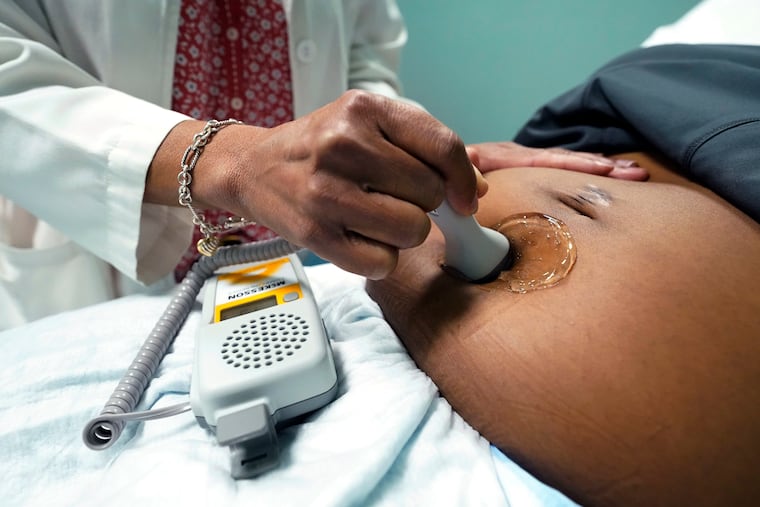Pa. lawmakers worked across party lines to improve conditions for incarcerated women
The Dignity for Incarcerated Women Act was signed by Gov. Josh Shapiro on Dec. 14 and requires Pennsylvania's prisons and jails to provide newborn parents with three days of bonding time.

HARRISBURG — Pregnant and postpartum parents will now have at least three days of bonding time with their newborn in Pennsylvania prisons, under a new state law intended to improve the conditions of incarcerated women.
The bipartisan law passed unanimously through Pennsylvania’s General Assembly last month makes a number of long-sought reforms — an uncommon point of agreement between the two hyper-partisan political parties — in how women and pregnant people are treated while incarcerated in the state’s prisons and jails.
The new Dignity for Incarcerated Women Act signed by Gov. Josh Shapiro on Dec. 14 comes at a time when incarcerated women have become the fastest growing population in the country and lawmakers nationally recognize a need to improve conditions for the often-overlooked segment of mass incarceration.
The issue has become one of few points of unanimous agreement between political parties, with conservative groups like the American Conservatives Union and criminal justice organizations all supporting changes to how the country treats pregnant people while incarcerated.
Tonie Willis, the founder of nonprofit Ardella’s House in Strawberry Mansion that serves incarcerated women during and after prison, first started working on the proposals more than five years ago, originally spanning across 15 different bills. The proposals were simplified down to one single bill housing several reforms, including the prohibition on shackling or solitary confinement of pregnant people unless absolutely necessary.
“It’s been a long time coming to treat women with respect,” Willis said.
What will the Dignity for Incarcerated Women Act do?
Among the many changes made in the new law, correction officers that work with pregnant people will now be required to undergo trauma-informed training to understand the additional stress these practices have on the parent and child.
The new state law also codifies that the Department of Corrections and counties provide free feminine hygiene and menstrual products to inmates, making the practice permanent in state law.
Pennsylvania houses more than 2,000 people in its two women’s prisons, and hundreds more in county jails across the state.
County jails and state prisons are already required to track when shackling pregnant people or placing them in restrictive housing, which is also known as solitary confinement. The new law further prohibits the use of these restrictions and has more detailed documentation requirements for correction officers. Among the other changes, male guards will not be allowed to search pregnant people under most circumstances.
‘A five-year journey’ that changed a lawmaker
Willis approached Philadelphia Delegation chair Rep. Morgan Cephas (D., Philadelphia) to sponsor the legislation more than five years ago, as well as Rep. Mike Jones (R., York). The two lawmakers worked across the aisle, along with Rep. Tina Davis (D., Bucks), to gather support among their colleagues until it finally passed the House and Senate unanimously last year.
Jones, who Willis jokes couldn’t even say the word “tampon” without getting red-faced, is now one of her best friends, she said. In testimony on the House floor last month, Jones said a 2019 trip to Muncy State Correctional Institution with the Pennsylvania Legislative Black Caucus — and where he met Willis — changed his life.
Through tears, Jones said the visit “sent me on a five-year journey to recognize that prisons were not designed with women in mind.”
“While they have done something to land themselves in that situation, these are still our mothers, our daughters, our sisters, and they deserve to be treated with dignity,” Jones added.
It took a significant education campaign to communicate to state lawmakers the need for these legislative changes, Cephas said. The passage of the federal version of this bill in 2018 during former President Donald Trump’s administration helped get more Republicans on board, she added.
“When we talk about criminal justice reform, it’s always about the men, and rightfully so because they’re the biggest population,” Cephas added. “But women are the fastest growing incarcerated population, and they come with a significant level of challenges that our system is not ready for.”
Cephas said she was excited that the law was passed at the same time as a new Clean Slate law and probation reforms, which will shorten the length of time a person is on probation and speed up the time it takes to automatically seal nonviolent misdemeanor and summary charges from a person’s record.
A spokesperson for the Department of Corrections said many of these changes are already agency policy and the department anticipates it’ll be able to absorb any costs for the new training required under the law. Both state prisons and county jails need to follow the new state standards of care for pregnant and menstruating people, which takes effect by June 2024.
Before the Department of Corrections began providing free tampons and pads to menstruating people, Willis said she’d hear from those who would be forced to choose between paying to call their families or buying feminine hygiene products. They’d choose to call their families, and use a sock or paper towel instead.
“This is a step forward in treating women with dignity and preparing them for when they do come home; they are still respected citizens,” Willis added.